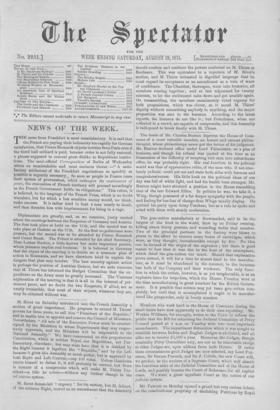The death of Mr. Charles Buxton deprives the House of
Com- mons of a most valuable member, an honest and earnest philan- thropist, whose philanthropy never got the better of his judgment. Mr. Buxton declined office under Lord Paltnerston, on a plea of business, and though his refusal was quoted at the time as an illustration of the difficulty of tempting rich men into subordinate office, he was probably right. His real function in the political, world was that of appreciative critic, of the man who, if not abso- lutely judicial, could yet see and state both sides with fairness and comprehensiveness. His little book on the political ideas of our day was full of white light, and had his health been stronger, Mr. Buxton might have attained a position in the House resembling that of the late Edward Ellice. In politics he was, we take it, a Whig, though possessed of a far deeper sympathy with the people, and feeling far less fear of change than Whigs usually display. He quitted his party upon Army Purchase, but as a rule he spoke and acted with them with steady moderation.






























